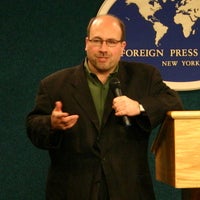Craig Newmark, noted philanthropist and founder of the wildly successful no-frills website Craigslist, visited HLS in a Berkman Center-sponsored informal discussion on November 14. (Watch the webcast.)
Discussing the history of the website he founded, his multiple roles at the company (though he is the founder and chairman of the board, his day-to-day work is in customer service) as well as some of the lessons he’s learned over the years, Newmark described his approach to business and life as “nothing altruistic or noble…it’s just one person helping another out.”
Newmark said his role as customer service representative epitomizes this approach. When the decision was made to transform Craigslist from a hobby to a for-profit endeavor, Newmark built his new business around the simplest model he could imagine: “We can do well as a business just by treating people well.” Though the company has gone through its share of challenges since those early days of the mid-nineties, the customer service-first approach has allowed Craigslist to navigate those potential potholes well.
Regarding the site’s recent and well-publicized steps to combat prostitution and exploitation in its controversial “Erotic Services” section, Newmark was resolute: abuse was happening, he explained, and it was in the best interests of the Craigslist community and people everywhere for the company to work as best it could with law enforcement experts. On a lighter note, he explained that his interaction with law enforcement has always been marked by friendly cooperation, dating back to the website’s very first visit from the FBI, in regard to a purported sale of plutonium (which turned out to be nothing more than a prank by a local high school student.)
In spite of ups and downs, Craigslist remains one of the most successful of community-driven or “Web 2.0” sites, regularly reaching Alexa Internet’s top ten list of highest-traffic websites in the United States. But Newmark is modest about his role, explaining that everything on the site comes from community feedback. “I have no vision at all,” he said, “but I like to keep things simple, and I can listen.”
Lately, Newmark has been applying his community-building skills to the realm of politics and social activism. He counts among his many projects and affiliations the Consumer Union, Iraq and Afghanistan Veterans of America, the anti-corruption organization Sunlight Foundation, OneVoice (a grassroots organization of peace advocates in Palestine and Israel) and a number of local initiatives around the San Francisco Bay area. Corruption in government is a frequent pet topic of his, and he sees the inter-connective nature of the Internet as the answer to most of what ails modern politics. “Grassroots efforts can compliment representative democracy to improve our democracy and get stuff done,” he said.
Though a self-defined “Libertarian Moderate,” Newmark still wears his Barack Obama wristwatch. He was drawn to the campaign’s openness to the Internet and the possibilities of community organizing. Post-election, he has continued to assist the President-elect’s team with the current transition, advising and sitting in on committees, “trying to help people who can get things done.”
Newmark said he sees his politics as simply trying to find balance. Even on hot-button issues such as net neutrality, the pragmatism and simplicity that have served him well in business shine through: “Sometimes you need anonymity. Sometimes you need accountability.”
–Anthony Lux
